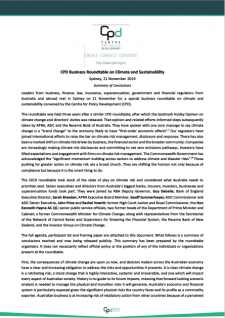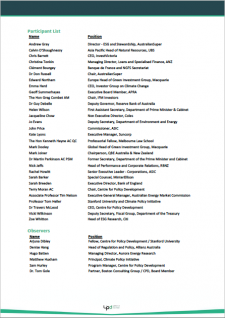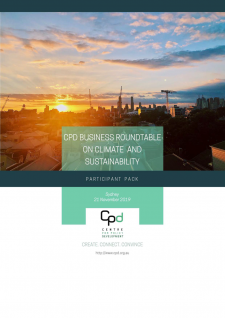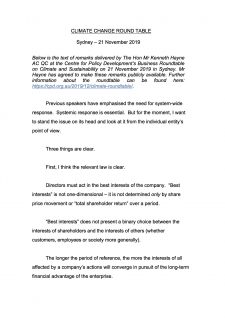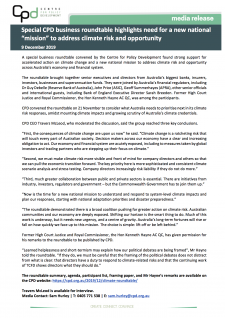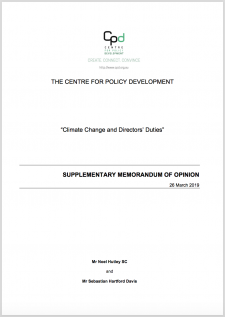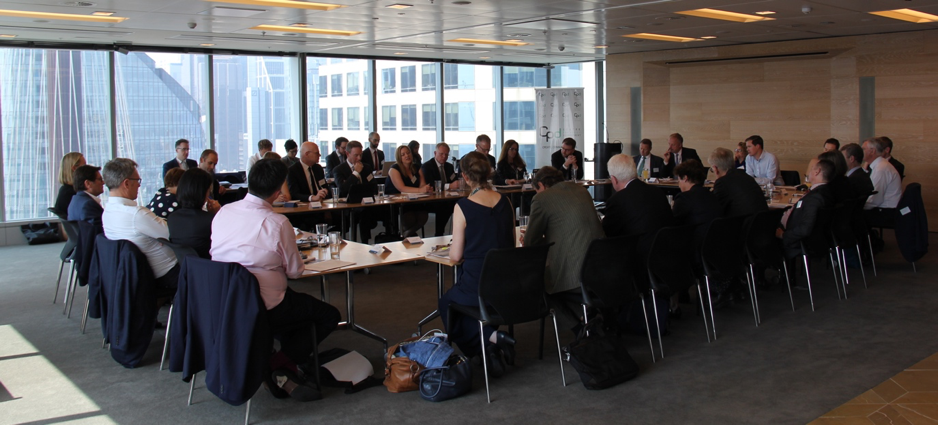
On 21 November, CPD convened a business roundtable on climate change and sustainability which brought together senior executives and directors from Australia’s biggest banks, insurers, investors, businesses and superannuation funds, senior representatives from Australia’s leading financial regulators and key policy departments, and a number of special local and international guests.
Participants included Dr Guy Debelle (Reserve Bank of Australia), Sarah Breeden (Bank of England), John Price (ASIC), Geoff Summerhayes (APRA), Emma Herd (IGCC), Don Russell (AustralianSuper), Martin Parkinson (former Secretary of the Department of Prime Minister and Cabinet and Treasury), Sarah Barker (Minter Ellison), Greg Combet (IFM Investors) and former High Court Justice and Royal Commissioner the Hon Kenneth Hayne AC QC.
CPD convened the roundtable to consider what Australia needs to prioritise next in its climate risk responses, amidst mounting climate impacts and growing scrutiny of Australia’s climate credentials. This was the latest in a long-running series of CPD research, events and thought leadership on the economic and financial dimensions of climate change, including the legal opinions by Noel Hutley SC on directors’ duties and climate risk, and landmark public statements on climate by APRA, ASIC and the Reserve Bank hosted by CPD since 2017.
The discussion highlighted that the bar on climate risks continues to rise for Australian company directors, investors and regulators. It also found strong support for accelerated action on climate change and a new national mission to address climate risk and opportunity across Australia’s economy and financial system.
A summary of the main conclusions from the discussion is available below along with other key documents. Please note that this summary has been prepared by the roundtable organisers and does not necessarily reflect official policy or the position of any of the individuals or organisations present at the roundtable.
Key documents
Background
November’s event was held three years on from a similar CPD roundtable in 2016 which culminated in the release of the landmark Hutley SC legal opinion on climate change and directors’ duties (updated in 2019). Over the past three years, Australia’s financial regulators have stepped up their leadership on the financial and economic impacts of climate change through coordinated statements and responses by APRA, ASIC and the Reserve Bank. Many Australian companies and investors have now adopted more ambitious and detailed climate-related disclosures, targets and strategies. However, despite recent progress, Australia remains well behind global best practice, even as the physical impacts of climate change mount and the risks and opportunities associated with a zero carbon transition become more urgent and apparent.
At this critical juncture, our roundtable brought together a group of influential leaders to take stock of Australian approaches to climate risk to date and to consider the next set of crucial interventions and opportunities to deliver more far-reaching responses. The discussion was held under the Chatham House Rule.
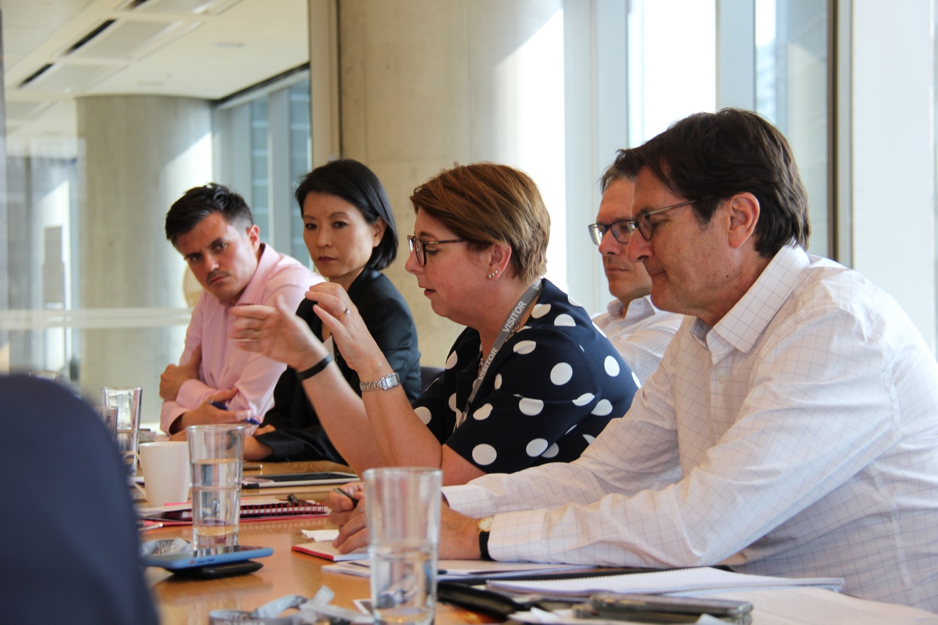
(From left to right) Roundtable participants Nick Jeffs (Reserve Bank of New Zealand), Jacqueline Chow (Coles), Sarah Breeden (Bank of England), Guy Debelle (Reserve Bank of Australia) and Greg Combet (IFM Investors).
Discussion and outcomes
Bank of England Executive Director Sarah Breeden provided opening remarks for the discussion. Sarah provided a snapshot of global trends and regulatory responses on climate risk, including new initiatives being undertaken by the Bank of England and the Central Banks and Supervisors Network for Greening the Financial System.
The Hon Ken Hayne AC QC also addressed the group, and has provided the text of his remarks for publication by CPD. He said that the law, international opinion and Australian regulatory developments make the position for company directors clear: “directors have a duty to respond to climate-related risks and…the continuing work of the TCFD shows directors what they should do.”
“A response often seen in Australian political discourse is that “The issue is large; Australia is comparatively small; nothing we do will affect the outcome if the big emitters do not act.” That is, the response is “We can do nothing that will help”. By making that response, we are persuading ourselves that we are helpless. Boards will reinforce that sense of helplessness if they put climate risk into a bucket marked “non‑financial risks”…[A]s recent events in the financial services industry should have shown, the notion of “non‑financial” risks can be very misleading…”
“[T]he choice for a board is between responding or having a response thrust upon the company. And boards simply cannot confine their attention to the short-term. As I have said, entities which did not look beyond short‑term profit have recently suffered very large financial and non‑financial losses…”
“Both learned helplessness and short‑termism yield a result that fits comfortably with those who still see climate‑change as a matter of belief or ideology. Framing the most recent debates provoked by the bushfire emergencies as part of the “culture wars” reinforces the notion that climate science is a matter of belief, not scientific observation and extrapolation. No less importantly, because the debate remains framed as a debate about belief, learned helplessness and short‑termism can be translated into the nativist‑populist terms that now have such currency in many political systems.” Mr Ken Hayne AC QC
Participants then shared their perspectives on how climate-related risks are being managed in Australia, and discussed opportunities and priorities for taking this response to the next level. The discussion highlighted three key conclusions:
- First, the consequences of climate change are upon us now, and decision makers across the Australian economy have a clear and increasing obligation to address the risks and opportunities it presents. Australia’s economy and financial system is particularly exposed to climate impacts, and there has been a paradigm shift in regulatory and legal expectations on climate risk management and disclosure. Boards must recognize the nature and scope of climate risk and respond accordingly, including through rigorous application of the TCFD framework.
- Second, climate risk must be made more visible and front of mind for company directors to pull forward the transition in the real economy. A significant ramp up in the availability and quality of decision-relevant information is required. Regulators, firms, governments and sectors will need to work together to establish consistent scenarios, to share data, and to identify and commit to science-based targets and a net-zero trajectory consistent with the Paris Agreement. Joint work and resources to underpin more rigorous and consistent scenario analysis and stress testing is a key priority.
- Third, more effective collaboration and leadership across the public and private sectors is an essential condition to understand and respond to climate risk and opportunity as it impacts the Australian economy as a whole. Multiple initiatives are underway to better understand sustainable finance and climate and disaster risk across financial regulators, industry and government. Now is the time to join up this effort across public and private sectors to understand how climate risk impacts our financial system and economy, and what can be done about it. This needs to be an economy-wide mission, with suitable coordination and sharing of resources, data and expertise.
CPD CEO Travers McLeod said that the roundtable highlighted broad support and consensus around a more ambitious, co-ordinated response to climate risk.
“The seniority and breadth of the roundtable participants shows that there has been a step-change in awareness on climate-related risks. Statements by our leading financial regulators and their international peers have very clearly demonstrated that this is one of the most pressing financial and economic issues that we face, and leaders in business and industry are beginning to adress this challenge head-on.”
“Those pushing for greater action on climate risk are a broad church. They are shifting the horizon not only because of compliance but because it is the smart thing to do. There is broad awareness that the climate crisis poses increasingly serious risks for Australian firms and investors, and that there will also be major opportunities in a zero-carbon transition. What is needed now is a concerted shift from awareness to action.”
“Ideally, this would be embodied in a new national ‘mission’ to understand climate impacts and plan our responses, starting with national adaptation priorities and disaster preparedness. Much of this work is underway, but it needs new urgency, and a centre of gravity. Australia’s long-term fortunes will rise or fall on how we face up to this challenge in the decade ahead. The choice is simple: lift off or be left behind.” Travers McLeod
CPD would like to thank roundtable participants for their time and for being part of a candid and constructive discussion. We would also like to thank ANZ for hosting the event.
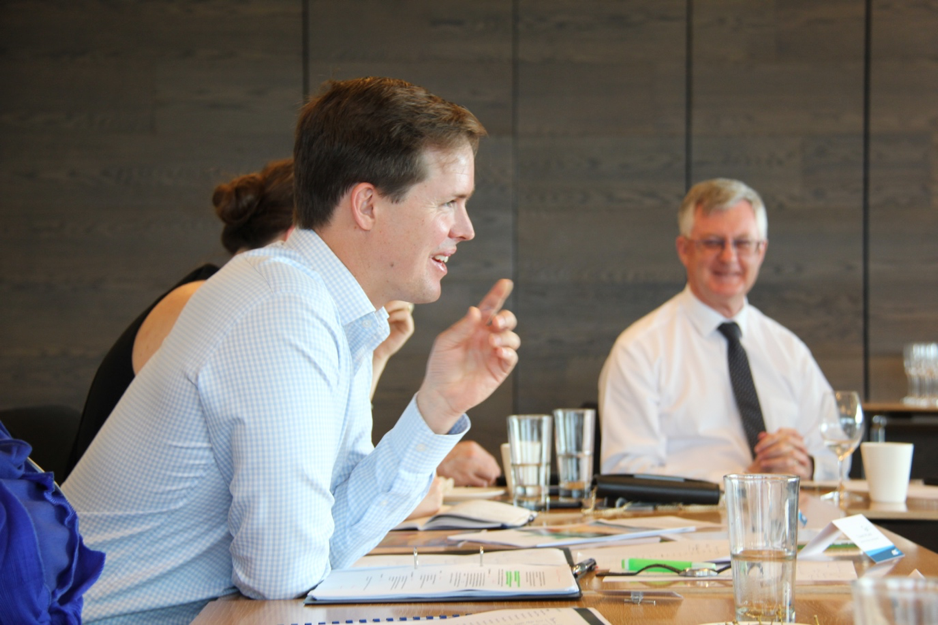
Travers McLeod and Martin Parkinson
Media coverage
Hayne rebukes directors on climate risk failure, James Fernyhough, Australian Financial Review, 9 December 2019
No more room for excuses on climate, Ben Potter, Australian Financial Review, 9 December 2019
RN Breakfast, ABC radio, 9 December 2019
Politics with Michelle Grattan, RN Breakfast, ABC radio, 9 December 2019
Hayne lambasts coalition attitude on climate change, urges businesses to act, The New Daily, 9 December 2019
Climate risk legal advice co-incided with military capability warning, Phillip Coorey, Australian Financial Review, 10 December 2019
Hayne climate rebuke “unfair”, says Yancoal, James Fernyhough and Peter Ker, Australian Financial Review, 10 December 2019
Climate change excuses won’t wash in court, say lawyers, Michael Pelly, Australian Financial Review, 10 December 2019
Climate change lawsuits are on the rise, Liz Main, Australian Financial Review, 10 December 2019
ASIC investigating large companies’ climate change risk management, Jack Snape and Peter Ryan, ABC News, 10 December 2019
Business is taking the lead on climate, Patrick Durkin and Brad Thompson, Australian Financial Review, 11 December 2019
Pressure mounts on Scott Morrison to act on climate as bushfire crisis continues, Sam Clench, news.com.au, 11 December 2019
There’s some sunlight behind the climate doom, and its coming from business, Jessica Irvine, Sydney Morning Herald, 12 December 2019
Legal action on climate is what we all want to avoid, Travers McLeod, Australian Financial Review, 13 December 2019
Adjusting to climate risks is only prudent, Henry Ergas, The Australian, 13 December 2019
Fires spread a pall of depression, Andrew Clark, Australian Financial Review, 13 December 2019
Climate change on the minds of regular people as much as the Greens, Greta Thunberg and Extinction Rebellion, The West Australian, 14 December 2019
A nation crying out for leadership from Scott Morrison got excuses, Peter Hatcher, Sydney Morning Herald, 14 December 2019
Banks first in line for climate tests, Michael Roddan, The Australian, 20 December 2019
ASIC next in line for climate watchdog role, Michael Roddan, The Australian, 24 December 2019
Further reading
Avoiding the storm: climate change and the financial system, speech by Bank of England Executive Director Sarah Breeden to Official Monetary & Financial Institutions Forum , April 2019.
Updated Hutley SC and Hartford Davis opinion on directors’ duties and climate risk, March 2019.
Climate change and the economy, speech by RBA Deputy Governor Dr Guy Debelle to Centre for Policy Development Public Forum, March 2019.
Climate change, speech by ASIC Commissioner John Price to Centre for Policy Development Public Forum, June 2018.
Climate horizons: scenarios and strategies for managing climate risk, Centre for Policy Development report by Sam Hurley and Kate Mackenzie, June 2018.
The weight of money: a business case for climate risk resilience, speech by APRA Executive Member Geoff Summerhayes to Centre for Policy Development Public Forum, November 2017.
CPD roundtable on directors duties, climate risks and sustainability, October 2016.
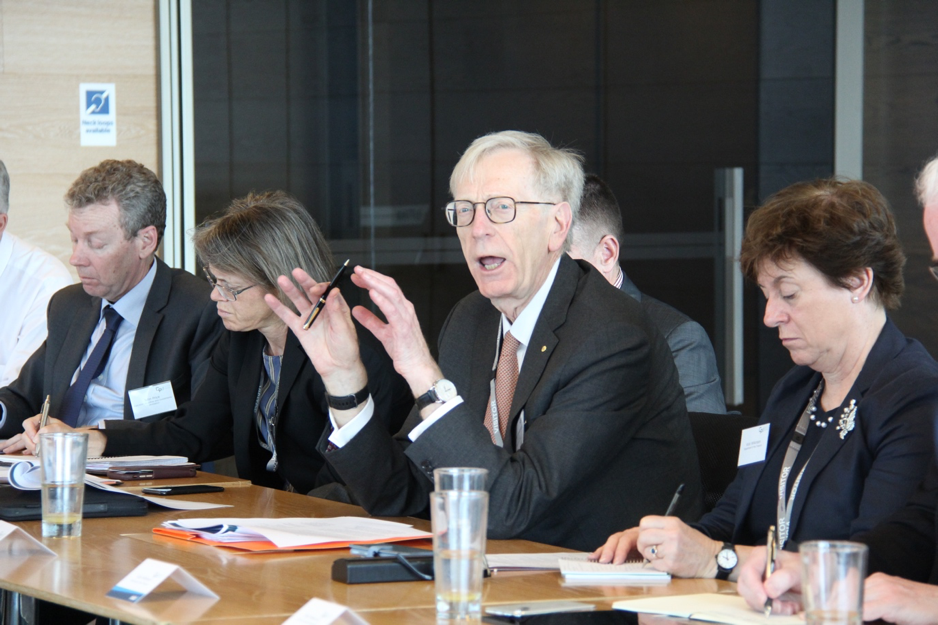
From left to right: Roundtable participants John Price (ASIC), Jo Evans (Department of Environment and Energy), Ken Hayne, Vicki Wilkinson (Treasury).

